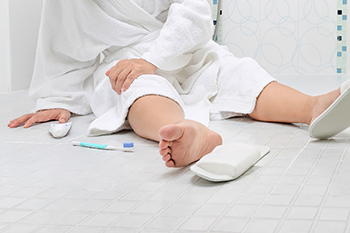Falling for an older adult can be very dangerous both physically and emotionally. According to the National Council on Aging, falls are the primary cause of injury for adults aged 65 and older. What’s more, feelings of depression and apprehension after a fall can prevent them from staying active as well. Here are some basic steps you can take to help the aging adult in your life avoid falling and tripping. Remove any clutter from walkways and stairs and make sure there is ample lighting in these areas. All staircases should have rails on both sides. Remove or secure any loose rugs or mats. In the bathroom, install grab bars in the shower and near the commode. Have their eyes examined to make sure their prescription is current. Check to make sure they aren’t taking any medications that make them drowsy or dizzy. If you see them struggling to get up out of chairs or if they are holding onto walls or furniture to walk around, schedule an appointment with a podiatrist. The podiatrist can assess and treat any existing foot conditions and analyze and correct their gait and balance issues with custom orthotics and shoe modifications. They can also suggest specific exercises and stretches to maintain optimal foot and ankle health.
Preventing falls among the elderly is very important. If you are older and have fallen or fear that you are prone to falling, consult with Leonora Fihman, DPM from California. Our doctor will assess your condition and provide you with quality advice and care.
Every 11 seconds, an elderly American is being treated in an emergency room for a fall related injury. Falls are the leading cause of head and hip injuries for those 65 and older. Due to decreases in strength, balance, senses, and lack of awareness, elderly persons are very susceptible to falling. Thankfully, there are a number of things older persons can do to prevent falls.
How to Prevent Falls
Some effective methods that older persons can do to prevent falls include:
- Enrolling in strength and balance exercise program to increase balance and strength
- Periodically having your sight and hearing checked
- Discuss any medications you have with a doctor to see if it increases the risk of falling
- Clearing the house of falling hazards and installing devices like grab bars and railings
- Utilizing a walker or cane
- Wearing shoes that provide good support and cushioning
- Talking to family members about falling and increasing awareness
Falling can be a traumatic and embarrassing experience for elderly persons; this can make them less willing to leave the house, and less willing to talk to someone about their fears of falling. Doing such things, however, will increase the likelihood of tripping or losing one’s balance. Knowing the causes of falling and how to prevent them is the best way to mitigate the risk of serious injury.
If you have any questions, please feel free to contact our offices located in Encino and Brentwood, Los Angeles, CA . We offer the newest diagnostic and treatment technologies for all your foot care needs.

